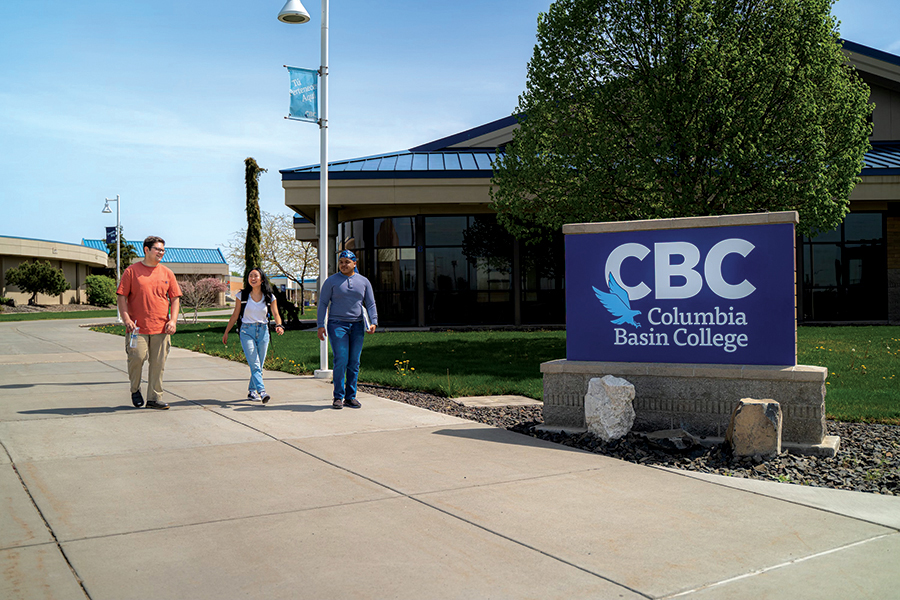
Home » Certificate options support workforce needs
Certificate options support workforce needs
WSU Tri-Cities, CBC offer variety of certificate options to students

Washington State University Tri-Cities in Richland offers a series of professional development classes geared toward businesses, including classes about wine tasting and the fundamentals of business.
Courtesy WSU Tri-CitiesMay 16, 2024
Higher education officials continue to partner with local industries to serve the needs of the business community, tailoring both non-credit and credit-based courses to amplify professional development and give students the ability to earn a certificate that represents their additional knowledge.
“It takes an ecosystem, and, at least from my perspective, it seems like whether it’s across an industry or it’s in a region, the focus on professional development and workforce training is a top priority,” said Joan Giese, an associate professor in the Carson College of Business at Washington State University Tri-Cities. “At WSU, we want to be that training partner.”
Cougar Tracks
WSU Tri-Cities markets these under its Cougar Tracks courses, including workforce training, such as Cultivating Service Excellence, Fundamentals of Business and Wine Tasting Room Server Training. All three are available online, year-round and the school is developing additional offerings.
“We’re trying to listen to these targeted learners and, of course, the business community about, ‘What are the needs?’ and ‘How we can be at the forefront of meeting those?’” Giese said.
Cougar Tracks courses are among the newest offerings at WSU, developed in just the last few years and targeted to those early in a career.
Other professional development courses are for those with more work experience. “Maybe a mid-level manager, those without business degrees. Or maybe they’re business owners, and they came into the business knowing their trade, their products and their customer, but they do not necessarily have the business background, and they’re looking to develop their knowledge more,” Giese said.
Those “learners” might have interest in courses related to costs and financial well-being, with some of those already available and others still in development.
“As the land grant university, we’re very heartfelt on meeting the mission, and we want to be nimble to meet the needs of the businesses that are so important to this state and to this region,” Giese said.
While some courses are newer or still under development, WSU-Tri-Cities has offered educational certificates for more than 20 years, including its viticulture and enology courses.
The viticulture certificate focuses on growing grapes and takes nearly two years to complete. It requires 11 courses and three “grape camps” that include hands-on activities and vineyard visits.
The enology certificate focuses on a scientific understanding of winemaking and the costs of opening a winery.
Each of these certificates accepts 35 students at a time and priority is given to those already working in the Washington wine industry.
Tuition varies
Tuition prices for WSU Tri-Cities certificates vary based on the course, with those requiring an in-person component priced higher.
Learning how to properly serve and sell wine is a self-paced course costing $249, whereas the expansive 20-month enology or viticulture certificate programs cost about $6,000.
“Our instructors who teach our certificate programs are our instructors who teach our undergrad program,” said Cody Thompson, enology program coordinator. “So, they interact with local wine veterans and that connection allows them to know what is needed and most relevant, and they can make adjustments to their education components to kind of cater to that, if necessary.”
This has included adjustments to cover the effects of smoke on grapes following many summers with wildfires.
While some certificates at WSU are non-credit options, the school also offers certificates through credited courses, with tuition costing the same as its per-credit rate of $575 per credit for the current school year. Those include undergraduate offerings in global leadership, molecular bioscience, professional science and technology writing, and professional writing.
Graduate certificates include English language learner, nurse educator, nursing leadership and public health.
“Our professional writing and science writing certificates are two of the most popular undergraduate certificates,” said Jana Kay Lunstad, WSU Tri-Cities’ campus registrar and director of financial aid.
These certificate courses are most often taken by students also pursuing a bachelor’s degree but can be taken by a “non-degree seeking student,” which allows for automatic admission.
“A certificate-only application is less expensive, and they’re not required to submit all their credentials to be evaluated, so they wouldn’t be required to submit their transcripts,” Lunstad said.
The school also offers an administrator’s credential through its College of Education for those looking to become a principal, program administrator or superintendent.
“Our education certificates have been steady, and we’ve seen more interest lately from undergraduate students looking to round out their skills with undergraduate offerings,” Lunstad added.
CBC’s programs
Columbia Basin College in Pasco has long offered a range of classes under its continuing education umbrella, including certifications in health care, automotive, traffic control or forklift operation.
CBC is using a grant from the Washington State Board of Community and Technical Colleges to cover $4,000 per student toward the cost of its commercial driver’s license program, valued at $5,600. Offered in partnership with Pasco’s T Enterprises Truck Driving School, it’s designed to help meet the needs of the trucking industry and a shortage of drivers.
A grant also covers the cost of a CBC non-credit course on safety training for forklift operation, taught in English or Spanish. The one-day class results in an operator safety card valid for three years.

Columbia Basin College in Pasco.
| Photo by Tyler West / Courtesy CBCMeeting employers’ needs
Like WSU, CBC also is trying to stay ahead of what employers need.
“What we’ve started to do is try to brainstorm,” said Jesus Mata, dean for career and technical education. “And that’s, ‘What workforce needs or training can we start providing?’”
Some of those needs are for the health care industry, one of the biggest employers in the region. Many of the short-term certificates available in CBC’s School of Health Sciences can lead to entry-level positions, including sterile processing, emergency medical and phlebotomy technicians. Program lengths range from 15 weeks to two quarters.
“The pay is pretty good for sterile processing technicians,” said Doug Hughes, dean for Health Sciences. “Most of my grads are making right around $18 to $21 starting out, and then there’s shift differential pay increases they could be eligible for after that. For two quarters, to get your foot in the door in health care, that’s pretty good.”
The school also offers additional certification for those who might have graduated and want further credentials, especially in fields like imaging, where jobs include radiologic technologist, or CT, mammography or MRI technicians.
There’s an advantage to students receiving a health care certificate from CBC if they plan on additional schooling.
“Whatever that field is, we actually give them an extra application point on another program, which is especially important in a competitive field like nursing,” Hughes said.
Giese said they don’t always see the non-credit certificate experience transition into a credited degree program, which isn’t the goal, either.
“I’d say it’s more common to see someone enjoy the certificate experience and then try to transition to a different certificate because they realize, ‘This is how I enjoy receiving my education and now I was to see what other offerings are.’”
Students in all programs range in age, from those with a high school diploma to someone with a Ph.D. or even past typical retirement age.
“I once had a surgical tech come in who was 67,” Hughes said.
Costs for certificated courses at CBC are the typical credit price for tuition, $123 per credit for the current school year for part-time students and about half that per credit for those enrolled full time.
The school also will work with students in short-term certificate programs to take another class, allowing them to become a full-time student and qualify for financial aid.
Latest News Education & Training
KEYWORDS May 2024
Related Articles





